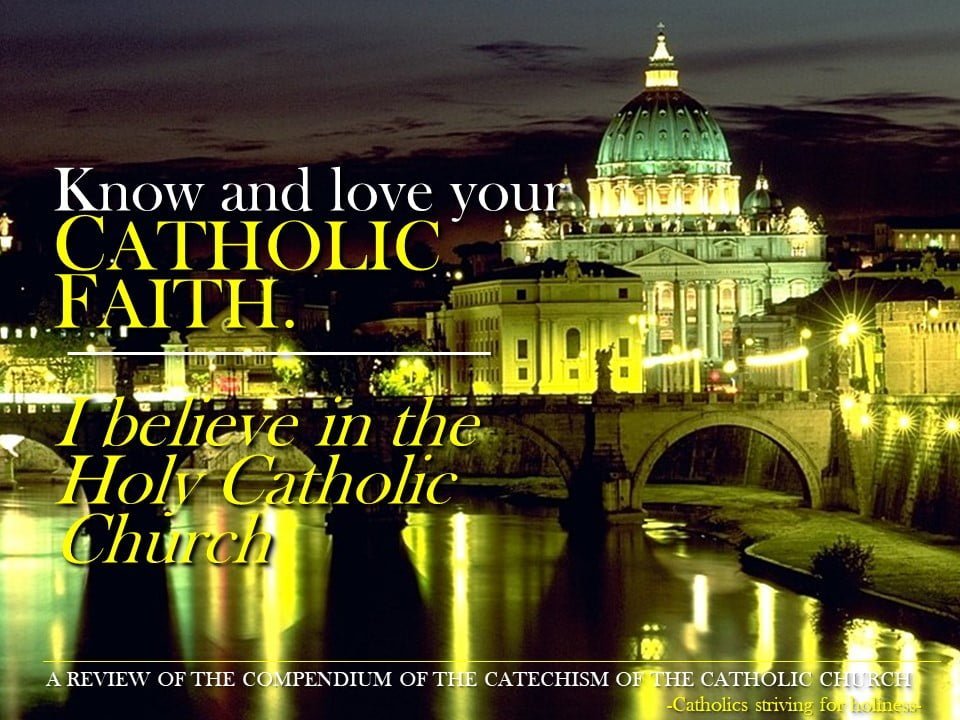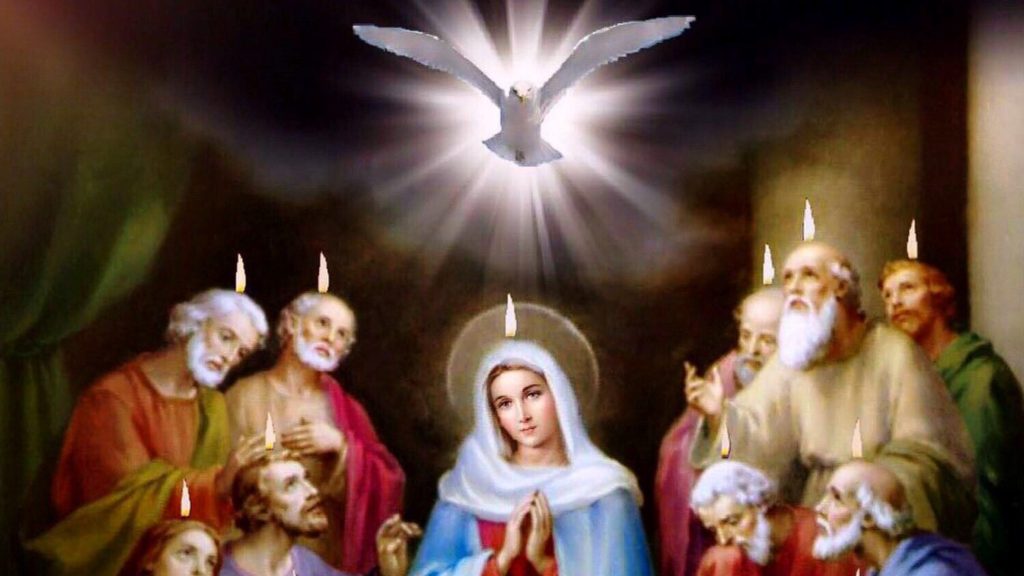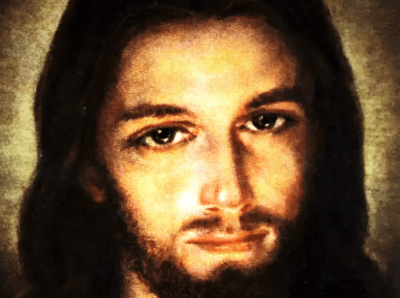Know and Love your Catholic Faith:
“I BELIEVE IN THE HOLY CATHOLIC CHURCH”
Compendium of the Catechism of the Catholic Church 147-176

LINKS
- What does the word Church mean?
- Are there other names and images with which the Bible speaks about the Church?
- What is the origin and the fulfillment of the Church?
- What is the mission of the Church?
- In what way is the Church a mystery?
The Church: people of God, body of Christ, temple of the Spirit
- Why is the Church the ‘people of God’?
- What are the characteristics of the people of God?
- In what way does the people of God share in the three functions of Christ as Priest, Prophet and King?
- In what way is the Church the body of Christ?
- Who is the Head of this body?
- Why is the Church called the “Bride of Christ”?
- Why is the Church called the temple of the Holy Spirit?
- What are charisms?
The Church is one, holy, catholic, and apostolic
- Why is the Church one?
- Where does the one Church of Christ subsist?
- How are non-Catholic Christians to be considered?
- How does one commit oneself to work for the unity of Christians?
- In what way is the Church holy?
- Why is the Church called “Catholic”?
- Is the particular Church catholic?
- Who belongs to the Catholic Church?
- What is the relationship of the Catholic Church with the Jewish people?
- What is the bond that exists between the Catholic Church and non-Christian religions?
- What is the meaning of the affirmation “Outside the Church there is no salvation”?
- Why must the Church proclaim the Gospel to the whole world?
- In what sense is the Church missionary?
- Why is the Church apostolic?
- In what does the mission of the Apostles consist?
- What is apostolic succession?
The Church in the Plan of God
147. What does the word Church mean?
751-752, 777,804
The word Church refers to the people whom God calls and gathers together from every part of the earth. They form the assembly of those who through faith and Baptism have become children of God, members of Christ, and temples of the Holy Spirit.
148. Are there other names and images with which the Bible speaks about the Church?
753-757
In Sacred Scripture we find many images which bring out various complementary aspects of the mystery of the Church. The Old Testament favors those images that are bound to the people of God. The New Testament offers images that are linked to Christ as the Head of this people which is his Body. Other images are drawn from pastoral life (sheepfold, flock, sheep), from agriculture (field, olive grove, vineyard), from construction (dwelling place, stone, temple), and from family life (spouse, mother, family).
149. What is the origin and the fulfillment of the Church?
758-766, 778
The Church finds her origin and fulfillment in the eternal plan of God. She was prepared for in the Old Covenant with the election of Israel, the sign of the future gathering of all the nations. Founded by the words and actions of Jesus Christ, fulfilled by his redeeming death and Resurrection, the Church has been manifested as the mystery of salvation by the outpouring of the Holy Spirit at Pentecost. She will be perfected in the glory of heaven as the assembly of all the redeemed of the earth.
150. What is the mission of the Church?
767-769
The mission of the Church is to proclaim and establish the Kingdom of God begun by Jesus Christ among all peoples. The Church constitutes on earth the seed and beginning of this salvific Kingdom.
151. In what way is the Church a mystery?
770-773, 779
The Church is a mystery in as much as in her visible reality there is present and active a divine spiritual reality which can only be seen with the eyes of faith.
What does it mean to say that the Church is the universal sacrament of salvation?
774-776, 780
This means that she is the sign and instrument both of the reconciliation and communion of all of humanity with God and of the unity of the entire human race.
The Church: people of God, body of Christ, temple of the Spirit
153. Why is the Church the ‘people of God’?
781, 802-804
The Church is the ‘people of God’ because it pleased God to sanctify and save men not in isolation but by making them into one people gathered together by the unity of the Father and the Son and the Holy Spirit.
154. What are the characteristics of the people of God?
782, 804
One becomes a member of this people through faith in Christ and Baptism. This people has for its origin God the Father; for its head Jesus Christ; for its hallmark the dignity and freedom of the sons of God; for its law the new commandment of love; for its mission to be the salt of the earth and the light of the world; and for its destiny the Kingdom of God, already begun on earth.
155. In what way does the people of God share in the three functions of Christ as Priest, Prophet and King?
783-786
The people of God participate in Christ’s priestly office insofar as the baptized are consecrated by the Holy Spirit to offer spiritual sacrifices. They share in Christ’s prophetic office when with a supernatural sense of faith they adhere unfailingly to that faith and deepen their understanding and witness to it. The people of God share in his kingly office by means of service, imitating Jesus Christ who as King of the universe made himself the servant of all, especially the poor and the suffering.
156. In what way is the Church the body of Christ?
787-791, 805-806
The risen Christ unites his faithful people to himself in an intimate way by means of the Holy Spirit. In this way, those who believe in Christ, in as much as they are close to him especially in the Eucharist, are united among themselves in charity. They form one body, the Church, whose unity is experienced in the diversity of its members and its functions.
157. Who is the Head of this body?
792-795, 807
Christ “is the Head of the body, the Church” (Colossians 1:18). The Church lives from him, in him and for him. Christ and the Church make up the “whole Christ” (Saint Augustine); “Head and members form, as it were, one and the same mystical person” (Saint Thomas Aquinas).
158. Why is the Church called the “Bride of Christ”?
796, 808
She is called the “Bride of Christ” because the Lord himself called himself her “Spouse” (Mark 2:19). The Lord has loved the Church and has joined her to himself in an everlasting covenant. He has given himself up for her in order to purify her with his blood and “sanctify her” (Ephesians 5:26), making her the fruitful mother of all the children of God. While the term “body” expresses the unity of the “head” with the members, the term “bride” emphasizes the distinction of the two in their personal relationship.
159. Why is the Church called the temple of the Holy Spirit?
797-798, 809-810
She is so called because the Holy Spirit resides in the body which is the Church, in her Head and in her members. He also builds up the Church in charity by the Word of God, the sacraments, the virtues, and charisms.
“What the soul is to the human body, the Holy Spirit is to the members of Christ, that is, the body of Christ, which is the Church.” (Saint Augustine)
160. What are charisms?
799-801
Charisms are special gifts of the Holy Spirit which are bestowed on individuals for the good of others, the needs of the world, and in particular for the building up of the Church. The discernment of charisms is the responsibility of the Magisterium.
The Church is one, holy, catholic, and apostolic
161. Why is the Church one?
813-815, 866
The Church is one because she has as her source and exemplar the unity of the Trinity of Persons in one God. As her Founder and Head, Jesus Christ re-established the unity of all people in one body. As her soul, the Holy Spirit unites all the faithful in communion with Christ. The Church has but one faith, one sacramental life, one apostolic succession, one common hope, and one and the same charity.
162. Where does the one Church of Christ subsist?
816, 870
The one Church of Christ, as a society constituted and organized in the world, subsists in (subsistit in) the Catholic Church, governed by the Successor of Peter and the bishops in communion with him. Only through this Church can one obtain the fullness of the means of salvation since the Lord has entrusted all the blessings of the New Covenant to the apostolic college alone whose head is Peter.
163. How are non-Catholic Christians to be considered?
817-819, 870
In the churches and ecclesial communities which are separated from full communion with the Catholic Church, many elements of sanctification and truth can be found. All of these blessings come from Christ and lead to Catholic unity. Members of these churches and communities are incorporated into Christ by Baptism and we so we recognize them as brothers.
164. How does one commit oneself to work for the unity of Christians?
820-822, 866
The desire to restore the unity of all Christians is a gift from Christ and a call of the Spirit. This desire involves the entire Church and it is pursued by conversion of heart, prayer, fraternal knowledge of each other and theological dialogue.
165. In what way is the Church holy?
823-829 , 867
The Church is holy insofar as the Most Holy God is her author. Christ has given himself for her to sanctify her and make her a source of sanctification. The Holy Spirit gives her life with charity. In the Church one finds the fullness of the means of salvation. Holiness is the vocation of each of her members and the purpose of all her activities. The Church counts among her members the Virgin Mary and numerous Saints who are her models and intercessors. The holiness of the Church is the fountain of sanctification for her children who here on earth recognize themselves as sinners ever in need of conversion and purification.
166. Why is the Church called “Catholic”?
830-831, 868
The Church is catholic, that is universal, insofar as Christ is present in her: “Where there is Christ Jesus, there is the Catholic Church” (Saint Ignatius of Antioch). The Church proclaims the fullness and the totality of the faith; she bears and administers the fullness of the means of salvation; she is sent out by Christ on a mission to the whole of the human race.
167. Is the particular Church catholic?
832-835
Every particular Church (that is, a diocese or eparchy) is catholic. It is formed by a community of Christians who are in communion of faith and of the sacraments both with their Bishop, who is ordained in apostolic succession, and with the Church of Rome which “presides in charity” (Saint Ignatius of Antioch).
168. Who belongs to the Catholic Church?
836-838
All human beings in various ways belong to or are ordered to the Catholic unity of the people of God. Fully incorporated into the Catholic Church are those who, possessing the Spirit of Christ, are joined to the Church by the bonds of the profession of faith, the sacraments, ecclesiastical government and communion. The baptized who do not enjoy full Catholic unity are in a certain, although imperfect, communion with the Catholic Church.
169. What is the relationship of the Catholic Church with the Jewish people?
839-840
The Catholic Church recognizes a particular link with the Jewish people in the fact that God chose them before all others to receive his Word. To the Jewish people belong “the sonship, the glory, the covenants, the giving of the law, the worship, the promises, and the patriarchs; and of their race, according to the flesh, is the Christ” (Romans 9:4, 5). The Jewish faith, unlike other non-Christian religions, is already a response to the revelation of God in the Old Covenant.
170. What is the bond that exists between the Catholic Church and non-Christian religions?
841-845
There is a bond between all peoples which comes especially from the common origin and end of the entire human race. The Catholic Church recognizes that whatever is good or true in other religions comes from God and is a reflection of his truth. As such it can prepare for the acceptance of the Gospel and act as a stimulus toward the unity of humanity in the Church of Christ.
171. What is the meaning of the affirmation “Outside the Church there is no salvation”?
846-848
This means that all salvation comes from Christ, the Head, through the Church which is his body. Hence they cannot be saved who, knowing the Church as founded by Christ and necessary for salvation, would refuse to enter her or remain in her. At the same time, thanks to Christ and to his Church, those who through no fault of their own do not know the Gospel of Christ and his Church but sincerely seek God and, moved by grace, try to do his will as it is known through the dictates of conscience can attain eternal salvation.
172. Why must the Church proclaim the Gospel to the whole world?
849-851
The Church must do so because Christ has given the command: “Go therefore and make disciples of all nations, baptizing them in the name of the Father and of the Son and of the Holy Spirit” (Matthew 28:19). This missionary mandate of the Lord has its origin in the eternal love of God who has sent his Son and the Holy Spirit because “he desires all men to be saved and to come to the knowledge of the truth” (1 Timothy 2:4).
173. In what sense is the Church missionary?
852-856
The Church, guided by the Holy Spirit, continues the mission of Christ himself in the course of history. Christians must, therefore, proclaim to everyone the Good News borne by Christ; and, following his path, they must be ready for self-sacrifice, even unto martyrdom.
174. Why is the Church apostolic?
857, 869
The Church is apostolic in her origin because she has been built on “the foundation of the Apostles” (Ephesians 2:20). She is apostolic in her teaching which is the same as that of the Apostles. She is apostolic by reason of her structure insofar as she is taught, sanctified, and guided until Christ returns by the Apostles through their successors who are the bishops in communion with the successor of Peter.
175. In what does the mission of the Apostles consist?
858-861
The Word “Apostle” means “one who is sent”. Jesus, the One sent by the Father, called to himself twelve of his disciples and appointed them as his Apostles, making them the chosen witnesses of his Resurrection and the foundation of his Church. He gave them the command to continue his own mission saying, “As the Father has sent me, so I also send you” (John 20:21); and he promised to remain with them until the end of the world.
176. What is apostolic succession?
861-865
Apostolic succession is the transmission by means of the sacrament of Holy Orders of the mission and power of the Apostles to their successors, the bishops. Thanks to this transmission the Church remains in communion of faith and life with her origin, while through the centuries she carries on her apostolate for the spread of the Kingdom of Christ on earth.
Stay updated: subscribe by email for free TO OUR NEW WEBSITE www.catholicsstrivingforholiness.org (PUT YOUR EMAIL IN THE SUBSCRIBE WIDGET).
We are also in www.fb.com/Catholicsstrivingforholiness. Kindly help more people in their Christian life by liking our page and inviting your family, friends and relatives to do so as well. Thanks in advance and God bless you and your loved ones! Fr. Rolly Arjonillo

